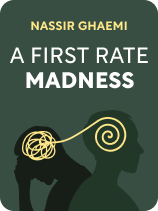

This article is an excerpt from the Shortform book guide to "A First Rate Madness" by Nassir Ghaemi. Shortform has the world's best summaries and analyses of books you should be reading.
Like this article? Sign up for a free trial here.
How does mental health affect work performance? How have bad mental health treatments destroyed well-known leaders?
Both good and bad mental health affect work performance. For most, it’s important to be in a healthy state of mind when working. However, some leaders actually benefit from poor mental health, especially during crisis situations.
Learn why A First-Rate Madness by Nassir Ghaemi says you need to check in on your mental health as a leader.
Good Mental Health Is Bad During Crises
How does mental health affect work performance? According to Ghaemi, mentally healthy leaders often make bad decisions during crises—they tend to be overly optimistic, less empathetic, unchallenged by struggles, and inflexible when compared to mentally ill leaders. He argues that while such leaders can be effective during peacetime, they often lack the right instincts during times of conflict. To make his point, he examines how mental health negatively affected the leadership of Neville Chamberlain, George McClellan, George W. Bush, and Tony Blair.
Ghaemi argues that the reason Neville Chamberlain, the prime minister preceding Winston Churchill, was unable to accurately assess the threat Hitler posed to the world was that Chamberlain was too mentally stable. Unlike Churchill, Chamberlain took a more conciliatory approach to the Nazi threat. Ghaemi argues that Chamberlain’s mental health prevented him from understanding the reality of the situation—that appeasement wouldn’t be an effective solution. Instead, the Prime Minister was overly optimistic, dismissed the German dictator’s belligerent intentions, and believed that war could be avoided through negotiation.
Similarly, Ghaemi argues that the sound mental health of General George B. McClellan, another Union commander during the Civil War, contributed to his military failures. Unlike with General Sherman, Ghaemi found no evidence that General McClellan suffered from any mental illnesses, and this prevented him from having bold, creative insights. McClellan consistently misjudged his enemies and limited himself to the traditional strategies he’d learned at West Point. His good mental health limited his ability to think outside the box and made him inflexible.
Finally, Ghaemi examines the leadership of George W. Bush and Tony Blair during the September 11 attacks in 2001, arguing that neither leader possessed the understanding or flexibility to properly handle the situation. Based on a review of their pasts, Ghaemi determines both Bush and Blair to be mentally healthy. He argues that both failed to approach the conflict with a nuanced perspective and decided to use military power to invade Iraq, a controversial decision that many have criticized.
How Proper and Improper Mental Health Treatment Affects Leadership
According to Ghaemi, the treatment of mental health also affects leadership—proper treatment can improve leadership while improper treatment can negatively impact leadership abilities. To explain how, Ghaemi takes us through the medical history of John F. Kennedy and Adolf Hitler.
According to Ghaemi, President John F. Kennedy and Adolf Hitler shared two notable similarities as leaders: Both had manic tendencies and both were treated with drugs that altered their mental states. While Kennedy successfully guided the US away from nuclear war thanks to his hyperthymic personality, Hitler set into motion a costly war that resulted in mass death and destruction.
For the first half of his presidency, doctors treated Kennedy with four kinds of steroids daily, which drastically altered his mood and impaired his ability to lead. However, by the early 1960s, they cut back on his steroid use, better managing the treatment of his mental illness. This proper treatment, Ghaemi argues, enhanced Kennedy’s positive manic traits (such as his high energy and resilience), contributing to his leadership successes during the second half of his presidency.
Specifically, these treatments allowed him to act appropriately when Soviet leader Nikita Khrushchev brought nuclear missiles to Cuba. Rather than limit himself solely to the black-and-white options of military action or inaction like Bush or Blair later would, Kennedy chose to establish a naval blockade that successfully led to Khrushchev withdrawing the missiles and avoided warfare.
In contrast, the improper treatment of Hitler’s bipolar disorder with amphetamines severely impaired his ability to lead. Before his abuse of drugs, Ghaemi argues, Hitler possessed many of the same positive leadership qualities associated with bipolar disorder such as the creativity of mania and the realistic judgment of depression. His abuse of amphetamines in 1937, however, exacerbated his illness, leading him to make extreme and aggressive military decisions that catapulted the world into World War II.

———End of Preview———
Like what you just read? Read the rest of the world's best book summary and analysis of Nassir Ghaemi's "A First Rate Madness" at Shortform.
Here's what you'll find in our full A First Rate Madness summary:
- How mental illness can make someone a better leader
- How leaders like Churchill and Roosevelt benefited from mental illness
- The pitfalls of being a mentally well leader during a time of crisis






